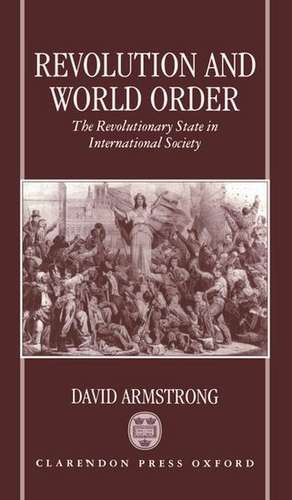Revolution and World Order: The Revolutionary State in International Society
Autor David Armstrongen Limba Engleză Hardback – 9 iun 1993
Preț: 891.03 lei
Preț vechi: 1353.32 lei
-34% Nou
Puncte Express: 1337
Preț estimativ în valută:
170.52€ • 176.16$ • 141.92£
170.52€ • 176.16$ • 141.92£
Carte tipărită la comandă
Livrare economică 14-20 martie
Preluare comenzi: 021 569.72.76
Specificații
ISBN-13: 9780198275282
ISBN-10: 0198275285
Pagini: 338
Dimensiuni: 143 x 224 x 25 mm
Greutate: 0.54 kg
Editura: OUP OXFORD
Colecția OUP Oxford
Locul publicării:Oxford, United Kingdom
ISBN-10: 0198275285
Pagini: 338
Dimensiuni: 143 x 224 x 25 mm
Greutate: 0.54 kg
Editura: OUP OXFORD
Colecția OUP Oxford
Locul publicării:Oxford, United Kingdom
Recenzii
`Well researched and valuable accounts ... much of considerable value.'Times Higher Education Supplement
`David Armstrong's book is a masterly examination of three key issues ... With a wealth of quotation and historical detail, Armstrong demonstrates that there is a logic and a common pattern in revolutionary perceptions of the international system ... What is more original in Armstrong's analysis is his sensitive exploration of how some residue of the original creed continues to play a part in the world-view of once-revolutionary states ... this book is striking for its admirably rich and varied haul of quotations ... not only the best book on its particular subject, but also makes a notable contribution to the understanding of international relations generally ... He has illuminated it superbly, and in so doing has added a dynamic element to the notion of the anarchical society.'Diplomacy and Society
'David Armstrong's scholarship and industry have come to the rescue; his book contains such a wealth of carefully drawn up material, shedding light on a wide cross-section of opinion as it unfolds, that even those students chronically unsure of themselves should be able to acquit themselves satisfactorily.'Susan Walker, Royal United Services Institute for Defence Studies, London, International Affairs, Vol. 70, No. 1, January 1994
`an enormously valuable ideological study of Westphalian `international society' ... His analysis is rich and instructive ... Only the staunchest neo-realist, in the end, will fail to learn from this study'International Journal
This is a perceptive, lucid and long overdue contribution to the literature.
The material in this book should be of great interest to students of international politics who want to know more about the possible effects of global social norms on state behaviour.
`David Armstrong's book is a masterly examination of three key issues ... With a wealth of quotation and historical detail, Armstrong demonstrates that there is a logic and a common pattern in revolutionary perceptions of the international system ... What is more original in Armstrong's analysis is his sensitive exploration of how some residue of the original creed continues to play a part in the world-view of once-revolutionary states ... this book is striking for its admirably rich and varied haul of quotations ... not only the best book on its particular subject, but also makes a notable contribution to the understanding of international relations generally ... He has illuminated it superbly, and in so doing has added a dynamic element to the notion of the anarchical society.'Diplomacy and Society
'David Armstrong's scholarship and industry have come to the rescue; his book contains such a wealth of carefully drawn up material, shedding light on a wide cross-section of opinion as it unfolds, that even those students chronically unsure of themselves should be able to acquit themselves satisfactorily.'Susan Walker, Royal United Services Institute for Defence Studies, London, International Affairs, Vol. 70, No. 1, January 1994
`an enormously valuable ideological study of Westphalian `international society' ... His analysis is rich and instructive ... Only the staunchest neo-realist, in the end, will fail to learn from this study'International Journal
This is a perceptive, lucid and long overdue contribution to the literature.
The material in this book should be of great interest to students of international politics who want to know more about the possible effects of global social norms on state behaviour.












